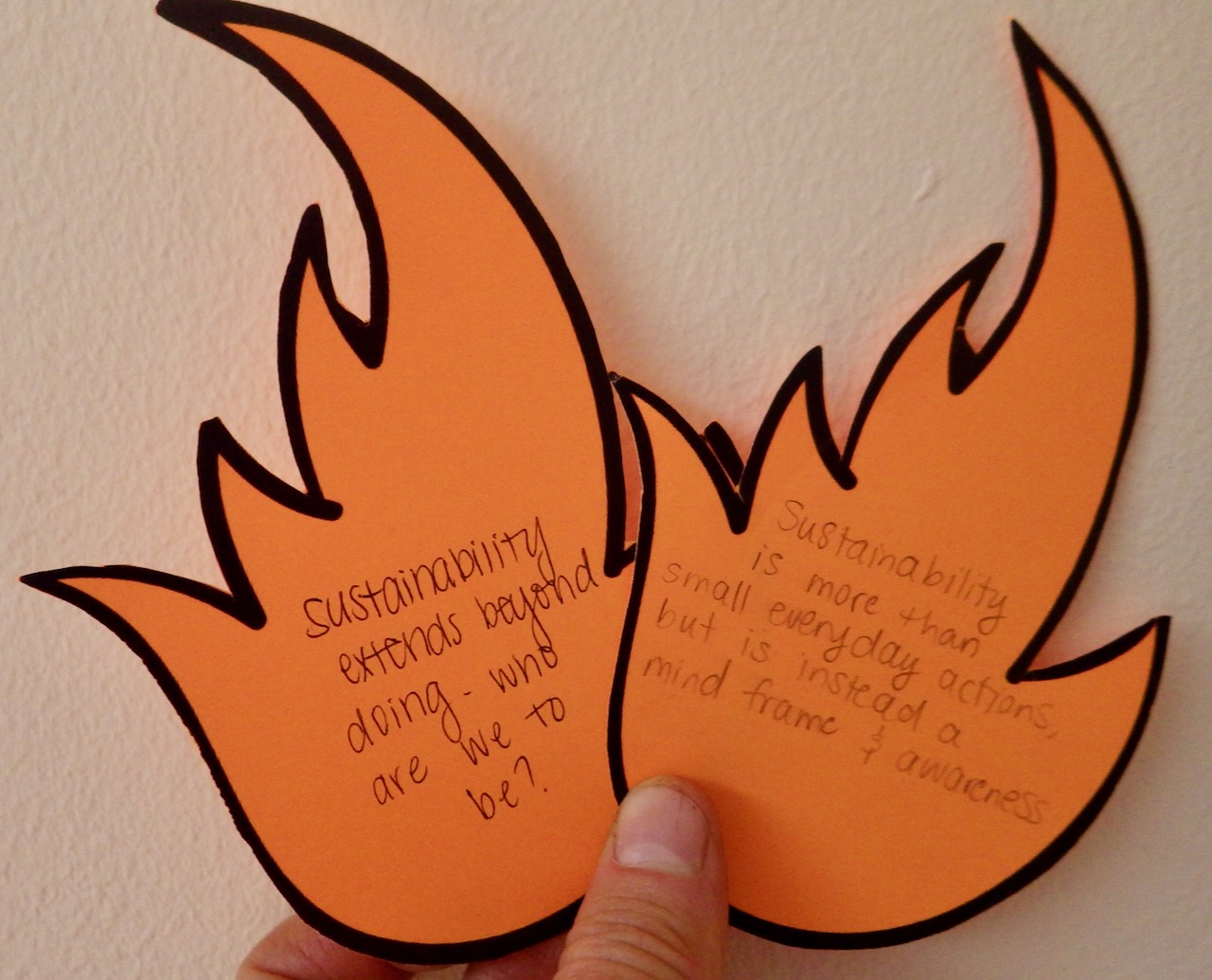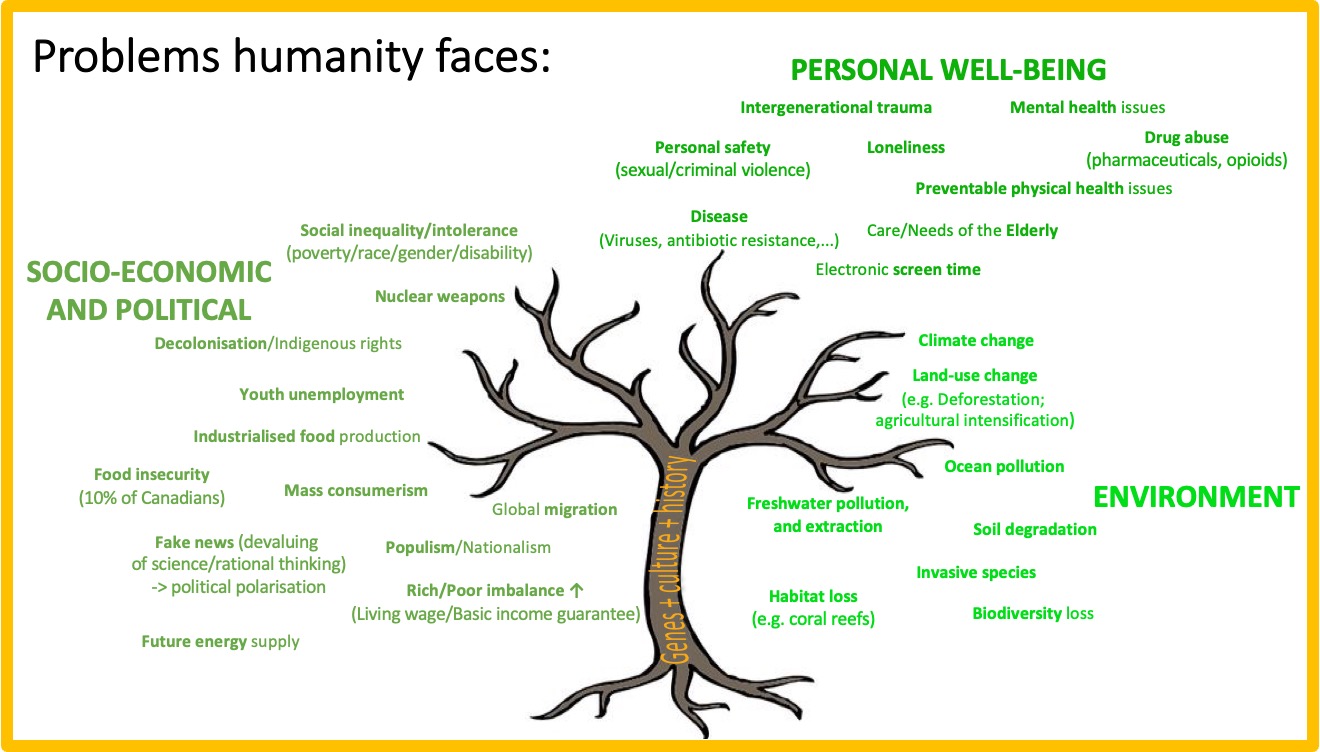Welcome to the BIOL 510 webpage for the Fall 2022 iteration of the course which is entitled:
The Biology of Sustainability: Maybe our greatest need now is not more knowledge but more wisdom
This ecology course is aimed at identifying and critiquing potential mechanisms by which our civilization could most effectively move toward more sustainable living. Biology can explain current environmental sustainability issues, but is also at the fundamental root of their underlying causes – human behaviour. Therefore, the biology of sustainability incorporates biogeochemical, ecological, economic, social, genetic, and philosophical features and constraints. Each iteration of the course will focus on a unique specific thematic question related to at least some of those components.
The principal question that the 2022 course will address is: Interconnectedness and impermanence: Is enhanced deep awareness of these fundamental biological principles the ultimate key to significantly advancing our species toward more sustainable living?
This course is for final year undergraduates and is specifically aimed at enhancing their capacities for critical thinking, intelligent open discussion, group work, and independent learning. Emphasis will be on interactive discussions and student-led seminars in which participants will have ample opportunities to explore, analyze and synthesize scientific information, to learn how the scientific process works, to speak and write effectively, and to develop their understanding of the philosophies underlying human behaviour and how they relate to global change issues, and the sustainability of our current civilisation. Students will lead informal seminar discussions on some component of this theme that is of particular interest to them.
The 2022 iteration of this course will be largely focussed on reading and discussion of biology professor Robin Wall Kimmerer's 2013 book Braiding Sweetgrass. Indigenous Wisdom, Scientific Knowledge, and the Teachings of Plants, but will also include other course theme-associated readings and activity exercises/workshops.
Learning outcomes:
By the end of this course, the student should be able to:
- Explain and contrast the term ‘ways of knowing’ from Indigenous, Western Science and Arts perspectives, and outline their historical roots and interconnections
- Describe the 17 United Nations Sustainable Development Goals and their unique significance, and evaluate them in the context of Indigenous values
- Discuss and critique the strengths and weaknesses of each of the core sustainability-related arguments proposed in Robin Kimmerer’s book Braiding Sweetgrass
- Formulate clear, original, challenging, and concise thematic questions from course reading materials that are likely to lead to focussed and intellectually-probing seminar group discussions, student-led seminar topics, and short essays
- Lead a stimulating, informative and creative seminar interpreting selected material from Robin Kimmerer’s book Braiding Sweetgrass in the context of this course’s focal question about interconnectedness and impermanence (see above)
- Develop and present a cohesive, original, synthesis final essay/media project on the potential value of incorporating the concepts of interconnectedness and impermanence to promote more sustainable living across our society
- Use the learning achieved in this course to develop lasting personal solutions for coping with, and constructively responding to, the major environmental and social sustainability issues of the 21st century.
Professor: Paul Grogan
Seminar times: Mondays 12.30; Wednesdays 11.30
Location: Room 3112 Biosciences building
Calendar: Sessions are 1.5 hours
Assessment:
15% Active participation in discussions (questions, comments, suggestions)
15% Seminar written questions
30% Seminar
40% Final synthesis exercise (10% outline; 30% final submission)
Schedule:
|
Date |
Topic |
Convenor |
Reading |
|
September 12th |
Course introduction |
Paul |
|
|
September 14th |
Sustainability: What can Biology tell us about our future, and how ought we to live? (I) Discussion: Video (Surviving Progress) |
Paul |
Surviving Progress (Documentary film) |
|
September 19th |
Sustainability: What can Biology tell us about our future, and how ought we to live? (II) |
Paul |
Grogan, P. 2013. Our Anthropocene Future - What can Biology tell us? Free Inquiry. February/March issue. Vol. 32(2):16-19. |
|
September 21st |
The U.N. Sustainable Development Goals: What exactly are they, what is their historical development, and why are they considered so fundamentally significant? |
Paul |
Kates, R., et al. 2005. What is Sustainable Development? Environment 47(3): 8-21
2022 United Nations SDG Report: https://www.youtube.com/watch?v=j2kB6831gVs&t=315s
Intro. to Seminar Guidelines |
|
September 26th |
Personal Land Acknowledgement
Introduction to Indigenous Ways of Knowing
|
Paul |
Webinar recordings: What does the Earth ask of Us? Dr. Robin Wall Kimmerer (Nov. 12th, 2020)
Rethinking our Science: Blackfoot Metaphysics Waiting in the Wings. Reflections by a Blackfoot. Dr. Leroy Little Bear (April 20, 2021)
Mazzocchi, F. 2020. A deeper meaning of sustainability: Insights from Indigenous Knowledge. Anthropocene Review 7(1): 77-93 |
|
September 28th |
Is the concept of sustainability derived from inherently feminine ideologies? |
Olivia Villani |
Kimmerer, R.W. 2013. Braiding Sweetgrass: Chapters 1-3 (Skywoman Falling – The Gift of Strawberries) |
|
October 3rd |
Can understanding the relationship between Goldenrods and Asters really teach humans how to live a more sustainable life? |
Mia Chartrand and Lauren Lebre |
Kimmerer, R.W. 2013. Braiding Sweetgrass: Chapters 4-6 (An Offering – Learning the Grammar of Animacy) |
|
October 5th |
Promoting a sustainable mindset: Would the incorporation of Indigenous family values into Western communities significantly deepen people’s awareness of interconnectedness and impermanence? |
Kira Henders and Rachel Orr |
Kimmerer, R.W. 2013. Braiding Sweetgrass: Chapters 7-9 (Maple Sugar Moon – A Mother’s Work) |
|
October 10th |
Thanksgiving holiday – No class |
|
|
|
October 14th |
Reading week break |
|
|
|
October 17th |
Field trip – Nature Walk. Elbow Lake Environmental Education Centre |
Paul |
|
|
October 19th |
How might the concept of motherhood influence one's relationship to the environment, and thus, influence one's personal sustainability? |
Sam Lucas |
Kimmerer, R.W. 2013. Braiding Sweetgrass: Chapters 10-12 (The Consolation of Water Lilies – Epiphany in the Beans) |
|
October 24th |
How could we raise awareness of reciprocity in a way that increases our personal sustainability and contributes, down the road, to sustainable living? |
Anjalie St-Louis-Hodgins |
Kimmerer, R.W. 2013. Braiding Sweetgrass: Chapters 13-15 (The Three Sisters – The Teachings of Grass) |
|
October 26th |
NO CLASS |
|
|
|
October 31st |
Teaching and Learning: Could enhancing awareness of Indigenous cultures of gratitude influence consumerist lifestyles? |
Grace Lumley and Julianna Larocque |
Kimmerer, R.W. 2013. Braiding Sweetgrass: Chapters 16-17 (Maple Nation: A Citizenship Guide – The Honourable Harvest) |
|
November 2nd |
Home: What is it, and must we find it to promote ecological and social sustainability? |
Agnes Urlocker |
Kimmerer, R.W. 2013. Braiding Sweetgrass: Chapters 18-20 (Becoming Indigenous to Place – Sitting in a Circle)
Intro. to Essay Guidelines |
|
November 7th |
Why would raised awareness of humanity’s connectedness to the rest of nature improve environmental sustainability? |
Harsukhman Dhillon |
Kimmerer, R.W. 2013. Braiding Sweetgrass: Chapters 21-23 (Burning Cascade Head – Umbilicaria – The Belly Button of the World) |
|
November 9th |
Coping with impermanence: Has the belief in an afterlife prevented western societies from becoming environmentally sustainable? |
Chelsea Howes-MacDonald
|
Kimmerer, R.W. 2013. Braiding Sweetgrass: Chapters 24-26 (Old-Growth Children – Windigo Footprints) |
|
November 14th |
How does western culture’s obsession with distractions from our mortality mask the authentic self, and therefore restrict our sustainability potential? |
Carissa Graham |
Kimmerer, R.W. 2013. Braiding Sweetgrass: Chapters 27-28 (The Sacred and the Superfund – People of Corn, People of Light) |
|
November 16th |
‘Being’, not ‘Doing’ - How can we in this class be the spark for the eighth fire?
|
Noelle Rendine and Emma Keen |
Kimmerer, R.W. 2013. Braiding Sweetgrass: Chapters 29-32 (Collateral Damage – Epilogue: Returning the Gift) |
|
November 21st |
No class – essay preparation |
|
|
|
November 23rd |
Field trip to the Agnes Etherington art museum exhibition entitled ‘Land Protectors’ |
|
|
|
November 28th |
Synthesis I
|
Paul |
|
|
November 30th |
Synthesis II |
Paul |
|
|
December 5th (Monday 12.30) |
NO CLASS |
|
|
.jpeg)
Top row: Mia Chartrand, Harsukhman Dhillon, Kira Henders, Emma Keen, moi, and Julianna Larocque.
Middle row: Sam Lucas, Carissa Graham, Agnes Urlocker, and Anjie St-Louis Hodgins.
Bottom row: Chelsea Howes-Macdonald, Grace Lumley, and Rachel Orr.
Olivia Villani, Noelle Rendine and Lauren Lebre are also members of our group but unfortunately could not join us that day.

%20final%20class%20photo.jpeg)
Back row: Moi, Mia Chartrand, Carissa Graham, Kira Henders, Olivia Villani, Emma Keen, Julianna Larocque, and Grace Lumley.
(Agnes Urlocker, Chelsea Howes-MacDonald, Lauren Lebre were active members of our group but not present on the photo day)
Final synthesis:
A few moments of video from my teaching in the final synthesis session of this seminar course. Context: This short clip from near the beginning introduces the argument that the ultimate cause of humanity’s current environmental and social sustainability crises is human behaviour, which is fundamentally influenced by the same genetically-endowed traits that all species exhibit (growth, resource accumulation, waste production, competition, survival, reproduction, etc.). Therefore, it is not at all surprising that humans have reached a point where we are living unsustainably – any species would under the appropriate conditions. The central theme of the final synthesis session in this ‘Biology of Sustainability’ course is that in addition to those basic biological traits and their associated impacts, our species also has consciousness. This seemingly unique trait provides us with the potential to cope with, and constructively respond to, the sustainability crises we face. By acknowledging and embracing the fundamental realities of our biology and of our existential predicament, consciousness (i.e. deep awareness) could lead us to suppress the influences of our more basic genetically-endowed traits so as to live in a more environmentally and socially sustainable (and possibly more contented) way.
Last Updated: 11 January, 2023
To see materials from previous iterations of this course, use the drop-down menu under the 'Teaching' tab at the top of this page
